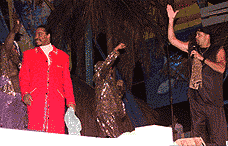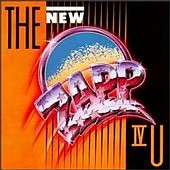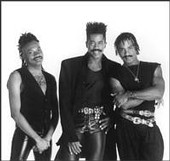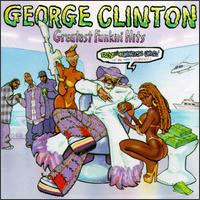 
|
Zapp

Produced by Roger and Zapp Troutman, 1980.
Hits:
Funky Bounce
Brand New Player
Zapp Vol III
 . .
Produced by Roger and Zapp Troutman, 1982.
Hits:
Dancefloor
Doo Wa Ditty |
Zapp

Zapp est un groupe à part sur
la planète funk. Culte et populaire à la fois.
Bien avant la techno-dance industrialisée que nous
connaissons depuis 1998, Zapp introduisait la Talk Box,
outil
permettant cette transformation vocale qui métamorphose
la voix humaine en hypnose robotique. Grâce à la Talk
Box, le groupe vas s'offrir, sous l'égide de son
chef Roger Troutman, une odyssée fantastique sur
les pistes de danse de la planète. Un swing imparable
orne la discographie du groupe, mélant Blues-Rock
et Funk cybernetique
avant l'heure avec un bonheur inavouable mais toujours humble.
Sans mégalomanie, Zapp a fait triompher un son
digital que les minets de Daft Punk et autres techno-amateurs
ont
récupéré sans efforts. Si Zapp a pu
influencer Prince, ce dernier à eu une influence
plus que remarquable sur leur quatrième album. Zapp
IV est démontre
une quasi adoration pour le "style" Prince de 1982
à 1984, preuve du séisme qu'ont provoqué
les productions pourpres des 80's.
A noter que le Zapp Vol. II est très difficile à trouver,
et d'après les fans, c'est le meilleur.
Longtime
before the techno-dance we already know since 1998,
Zapp introduced the Talk Box, a machine provoking
a
vocal effect that transforms human voice into
a hypnotic robotic voice. Along with the Talk Box,
Roger
Troutman created tracks that will make the discos go crazy
all over the world, making the crowds dancing to
a strange mix of
Blues, Rock and upfront cyber-Funk.
Without
any megalomania, Zapp has made a triumph with its
digital
style, making the band popular and cult.
If Zapp might have influenced Prince, the early 80's
Prince really influenced the Volume
IV Zapp album. Zapp IV is deadly princey, Prince is even
mentioned and
it sometimes sounds like a perfect could-have-been-produced-by-Prince.
But it's absolutly not, proof of the volcanic impact
that Purple sound had in those years.
|
Zapp IV U

Produced by Roger and Zapp Troutman,
1984
Hits:
It doesn't really Matter
Computer Love
Itchin' For Your Twitchin'
Radio people
Ja Ready To Rock
|
|
|
|
|
R4TW

Directed by RFTW, 1985.
Hits:
Oh Sheila
Digital Display
Ceramic Girl |
Ready
For The World
Un groupe du Michigan,
qui a additionné
les tubes au Top 10 en deux albums. Signés sur MCA,
aucun lien de famille avec Prince, si ce n'est la musique,
définitivement imprégnée du Funk-Rock
de Prince. Melvin Ryley, avec sa voie en or très
Soul, surf avec distinction sur des nappes tantôt électro funk,
tantôt rock, des plus puissantes. Les morceaux des
deux premiers albums (très similaires dans le style)
s'enchaînent
sans défaillir en efficacité. C'est ça Ready
For The World : du gentil macho romantique électrisé
qui réussie l'exploit du minimalisme parfait avec "I'm
The One Who Loves You", beauté touchante que
Prince doit avoir enragé de n'avoir pas écrit…
Les albums suivants sont à la hauteur du post Funk-Rock
: sans grand intérêt, le Rap pointait alors
le bout de son nez…
Une compilation "Oh Sheila
Greatest Hits" est sortie en 1993. Tous ces cd sont
dispos sur le net, ok ?
A Michigan
Funk band, Ready for the World had a pair of number one R&B
hits in the 80s for MCA. Riley, Gordon Strozier, Gregory Potts,
Willie Triplett, John Eaton, and Gerald Valentine began on
their own Blue Lake label. From 1984, the songs "Tonight",
"Deep Inside Your Love", the mega hit "Oh Sheila" (dedicated
to Sheila E), the fantastic "Digital Display," to 1986
with "Love You Down", the band was very popular, with a princey
orientation.
Straight Down to Business, in 1991, was their
most recent release.
This is definitly a "purple"
Band, especialy with "I'm The One Who Loves You"
and "Some People Don't Care" that Prince could
have written.
"Oh Sheila Greatest Hits", realeased
in 1993, is a Best Of RFTW and is avalaible online.
|
Long Time Coming

Directed by RFTW, 1986.
Hits:
Long Time Coming
Mary Goes Roun
Some People Don't Care
|
|
|

Hits:
She's Like Candy
Word Up
She's Strange |
Cameo
Il parait que Cameo
cassait la baraque funk en 1980 avec Cameosis, album légendaire.
En 1985,
Cameo récidive
avec les tube "Word Up" et "She's Like Candy",
princiers et clinquants à souhaits dans le phrasé
et le beat, mais pure Funk dans le feeling.
Cache-sexes en
plastique noir, cuissardes et coupes en brosse des années
pop, Cameo rassemble tous les grands frappeurs de pistes de danse.
Les versions maxi prolongent le plaisir, c'est l'euphorie
en stéréo. Cameo, c'est pas du pipo !
Cameo exploded
the funk bomb in 1980 with Cameosis. In 1985, Cameo did
it
again with "Word Up"and"She's Like Candy",
princey and sophisticated with slaping beats.
Black plastic
panties, leather and short haircut, Cameo was a solid disco
killer with many Billiboards hits.
Extended versions in stereo
makes the funky euphoria longer. Cameo is a blasting pure funk reference!
|
 
|
Greatest Funkin' Hits

Produced by Georges Clinton
Hits:
One Nation Under The Groove
Flash Light
Electric Spanking Babies
Do Fries Go With That Chips?
How Late Do U Have 2BB4UR Absent

Produced by Georges Clinton, 2005
Hits:
Bounce 2 This
Can U Paradigm
|
Funkadelic
- Parliament - George Clinton
Mélangeant
Rock psychédélique
des années 60 et Blues, Funkadelic est à l'origine
d'une sorte de Féderation "P-Fonk", pure-funk.
Auparavent,
George Clinton officiait dans son groupe Parliament. Parliament
enregistre
plusieurs succès durant 1967, puis Billy Nelson suggère
de créer Funkadelic, l'inspiration accrue par le
LSD et la culture psychédelique. Clinton forme donc
Funkadelic et en 1970 sort l'album éponyme.
Les
cinq membres de Funkadelic créent une curieuse confusion
avec Parliament, semblant ne faire qu'un seul et même
groupe. Le second album de Funkadelic démontre clairement
les influences classiques et l'essor du synthésizer
durant les 70's, créant
un jazz-fusion inspiré typique du P-Funk.
Après leur troisième album, Bootsy Collins rejoint
la bande et Funkadelic est signé par Warner Bros.
En 1975 le groupe livre son fantastique "Hardcore Jollies".
En 1977, Funkadelic enregistre son désormais classique
"One Nation Under The Groove" tandis que Parliament
cartone avec "Flash Light"… "Aqua Boogie "atteindra
le disque de platine. Cette schysophrenie musicale de George
Clinton est un modèle qui a activement inspiré Prince.
Jusqu"en 1977, les deux groupes
surfent sur l'or. Les membres originaux de Parliament ,
Fuzzy Haskins,
Calvin Le Simon et Grady Thomas quittent la P-Funk Organisation
pour créer leur label. 1981, avec "Connections and
Disconnections" Funkadelic remet ça mais en 1980,
Clinton a déjà délaissé Parliament
et Funkadelic (mais pas les musiciens) pour commencer
sa carrière
solo avec "Computer Games" en 1982. Hélas,
les 80's dédaignent le P.Funk , lié aux ringardes
70's , et le succès se fait la malle…
Mais c'est dés 1989 que Prince tend la main à un
Georges Clinton abandonné et perdu par la drogue avec
sa participation au projet Grafity Bridge et l'album Smell
My Fingers. Ainsi, c'est un George Clinton résuccité qui percute le funk aux Gramy Awards
2004 entouré de deux géénrations funk
: EWAF et Outkast !Au début
des années 90 Dr. Dre et Warren G réssucitent
le plus grand groupe Funk des 80's et de nouveaux funk-rockers
(Primus et Red Hot Chili Pepper) rétablissient le
statut royal de Clinton & co, une des forces les plus importantes
de l'histoire de la musique
noire.
2005,George Clinton & the P-Funk All Stars sort son 9ème album, le double CD 2bb4ur, avec la participation de Prince à la guitar et l'emprunt du morceau Clintonien Princier "Can U Paradigm". Peut-être pas plus de 5 titres sont supers voir ok. Le reste c'est de la soupe indigeste rap, R&B totalement inutile. Le P-Funk serait-il définitivement mort ?
Released in
1970, Funkadelic's self-titled debut album listed only
producer
Clinton and the five members of Funkadelic. Just after the
release of their third album, "Maggot Brain",
P-Funk added yet another big contributor, Bootsy Collins.
Funkadelic
moved to Warner Bros
in 1975 and delivered its major-label
debut "Hardcore Jollies" one year later to lackluster
sales and reviews. The same year, Westbound raided its vaults
and countered with Tales of Kidd Funkadelic. Ironically,
the album did better than Hardcore Jollies and included
an R&B
Top 30 single, "Undisco Kidd."
In 1977, Westbound released
The Best of the Early Years while Funkadelic recorded what
became its masterpiece (and arguably the best P-Funk release
ever), 1978's One Nation Under a Groove. During the most
successful
year in Parliament/Funkadelic history, Parliament hit the
charts first with "Flash Light," P-Funk's first R&B number
one. "Aqua Boogie" would hit number one as well late in
the year, but Funkadelic's title track to One Nation Under
a Groove
spent six weeks at the top spot on the R&B charts during
the summer. The album, which reflected a growing consistency
in
styles between Parliament and Funkadelic, became the first
Funkadelic LP to reach platinum (the same year that Parliament's
Funkentelechy Vs. the Placebo Syndrome did the same).
In
1979, Funkadelic's "(Not Just) Knee Deep" hit number one
as well, and its album (Uncle Jam Wants You) reached gold
status. At
just the point that Funkadelic appeared to be at the top
of its powers, the band began to unravel. In early 1981,
they
hit the R&B charts with a single called "Connections and
Disconnections,"
recorded as Funkadelic. To confuse matters more, the original
Funkadelic appeared on the charts at the same time, with
the
title track to The Electric Spanking of War Babies. This
schysophrenia has actively inspired Prince.
During 1980, Clinton
began to be weighed down by legal difficulties
arising from Polygram's acquisition of Parliament's label,
Casablanca. Jettisoning both the Parliament and Funkadelic
names (but not the musicians), Clinton began his solo career
with 1982's Computer Games. He and many former Parliament/Funkadelic
members continued to tour and record throughout the '80s
as the P.Funk All Stars, but the decade's disdain of everything
to do with the '70s resulted in critical and commercial neglect
for the world's biggest funk band, especially one which
in
part had spawned the sound of disco. During the early '90s,
the rise of funk-inspired rap (courtesy of Digital Underground,
In 1989, Prince saved George Clinton from chaos with his
Grafity Bridge collaboration and signed him on his label
Paisley park for the new album "Small
My Fingers".
Dr.
Dre and Warren G.) and funk-rock (Primus and Red Hot Chili
Peppers) re-established the status of Clinton & co.,
one of the most important forces in the recent history of
black music.
Gramy Awards 2004: George Clinton funks the house along with
2 funk generations: AWAF and Outkast.
2005, George Clinton & the P-Funk All Stars releases his 9th album, the double CD 2bb4ur, with Prince playing some guitar and the Clintonian title "Can U Paradigm" signed by Prince. Maybe about 5 tracks are great or ok. The rest is bad rap, R&B and totally useless material. Is P-Funk dead? .

|
|
|